
In geo-political terms, Singapore has always struggled a little with its underdog status: a tiny dot of a rock at the foot of the Malayan Peninsula teeming with lush vegetation, a tough mix of Chinese, Indian, Malay and European settlers, and not much else by way of natural resources.
The thing about underdogs, of course, is how they always seem to sneak up from behind and surprise you. Which is why most first-timers to Singapore are invariably nonplussed by the extraordinary spectacle before them.
Cut from the apron strings of Mother England in 1965, this former colonial outpost - so quaintly remembered by Somerset Maugham and scratchy Movietone newsreels - has leapfrogged into first world status in barely a generation.
A new cohort of young, professional expats and returning diaspora now call the city home. And why not? Today, Singapore is a heaving tropical metropolis where sparkling skyscrapers are framed by emerald swathes of incredibly fecund vegetation. Its GDP figures, treasury reserves, quality of life, standard of living indices and tourism numbers are the envy of the world. The financial crisis that stormed through London and New York was a localised squall.
If this were a movie, Singapore would be a blockbuster starring Tom Cruise.
But the most compelling subplot has been the city-state's dalliance with its creative side. With great energy and determination, both the public and private sectors have -- almost overnight, it seems -- transformed a once staid artistic backwater into a powerhouse.
This explains why Wallpaper* has long championed Singapore, and why we felt the time was ripe for an updated, in-depth look at its creative prowess, and the talented people who work so hard behind the scenes.
Receive our daily digest of inspiration, escapism and design stories from around the world direct to your inbox.
The muscular skyline is sprinkled with eye-catching silhouettes. Centuries-old shop-houses are being sensitively made over into offices, boutiques and bijou hotels. The concert halls thrum with first-rate concerts, while daring film-makers are making the kind of socially conscious movies that would have been unheard of a decade ago. On the gourmet front, local tastemakers stand proud alongside the likes of Mario Batali, Guy Savoy and Wolfgang Puck.
As the Wallpaper* team of reporters and photographers scoured the island, dipping in and out of ateliers and art galleries, we took notes and found plenty to admire. What struck us most, though, was not how far Singapore has come in so short a time, but rather how much untapped potential there is. A thrilling sense of potential hangs in the air.
Punching way above its weight category, Singapore's plucky determination to mix it up with the best of the best is, we think, the biggest story out there. Stay tuned for the sequel.

A new cohort of young, professional expats and returning diaspora now call the city home.
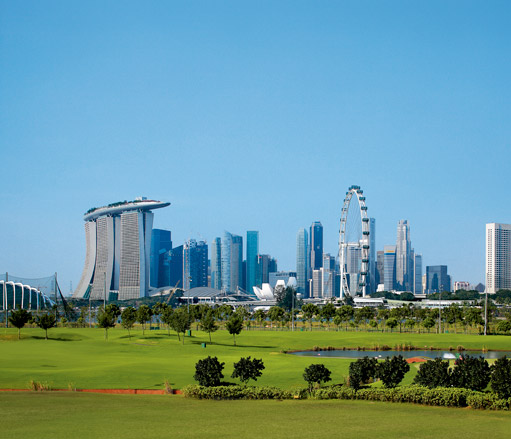
A view of the singapore skyline from the Marina Bay Golf Course.
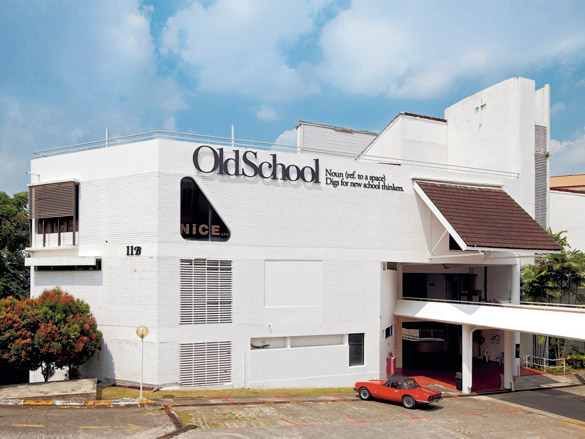
Housed in a former Methodist girls’ school, the Old School on Mount Sophia is a new mixed-use complex incorporating a cinema, artists’ studios, galleries and café spaces.
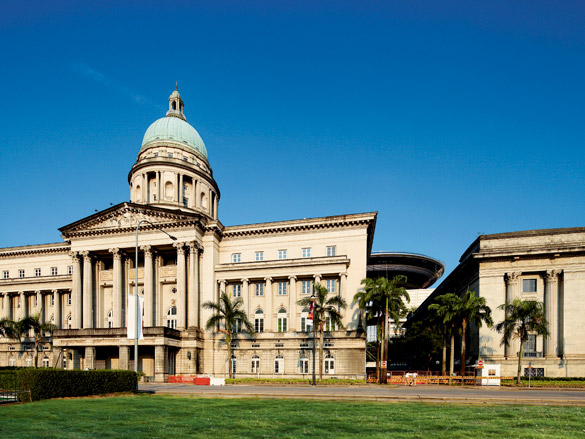
Singapore’s old Supreme Court building (replaced by a Foster + Partners design in 2005, just visible in the background) and City Hall are being transformed into the city’s first national art gallery by French practice Studio Milou. The project, which will link the two historic buildings with a giant glass canopy, is due to be completed in 2013.
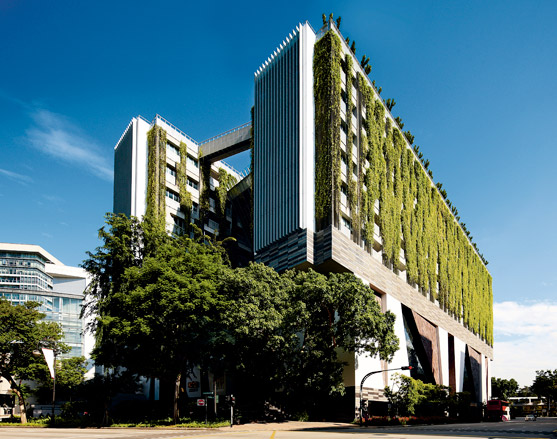
Designed by award-winning local practice WoHa, Singapore’s School of the Arts is training the city’s next generation of bright young creatives.
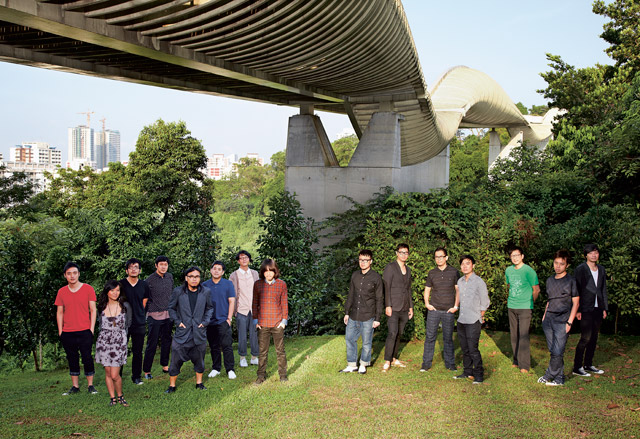
Singapore’s top talents, pictured under the Henderson Waves pedestrian bridge in the Southern Ridges park.
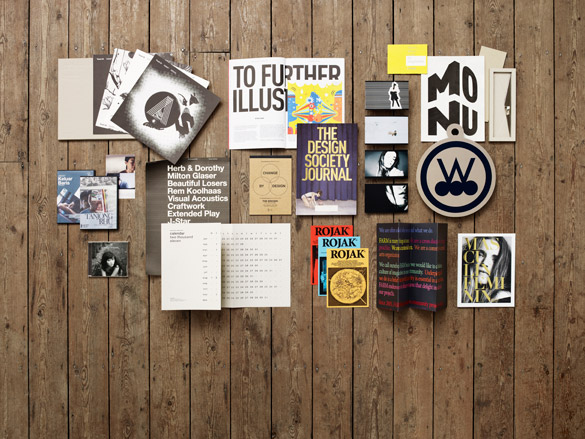
A spread of creative work by film-maker Boo Junfeng, singer / songwriter Inch Chua, Silnt designer Felix Ng, design organisation The Design Society, Commonground creative director Darren Lee, design studio and art organisation Farm, photographer Stefan Khoo, and &Larry creative director Larry Peh.
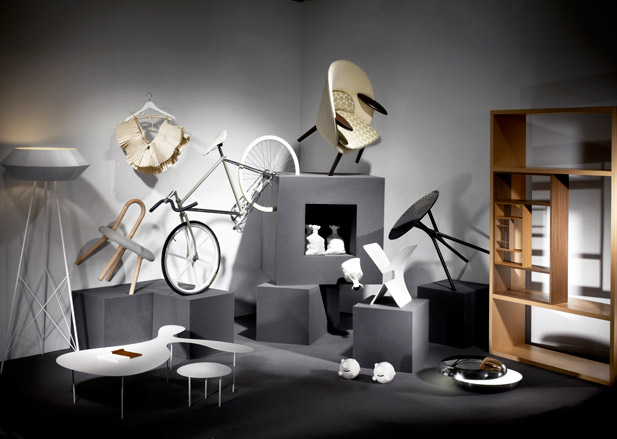
Singapore’s next design tricks
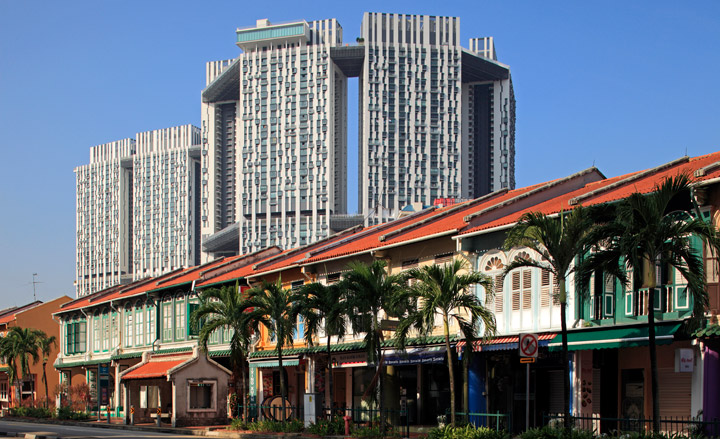
On Singapore’s Tanjong Pagar Road, traditional shop-houses are dwarfed by the new apartment blocks of the Pinnacle on Duxton Plain. Designed by ARC studio for 100,000 residents, the public housing scheme comprises of seven slim towers and two communal sky gardens.
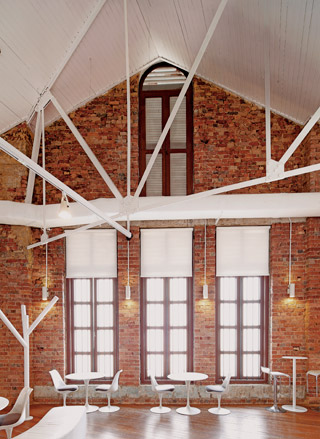
This picture, the Singapore offices of advertising agency BHH Global are located in an old riverside warehouse transformed by local practice Ministry of Design.
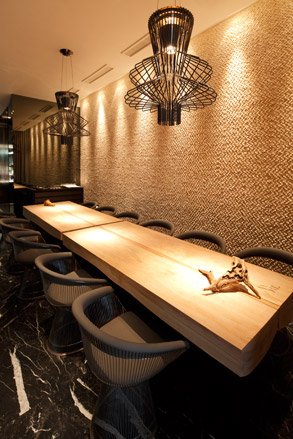
Restaurant André, located in a 1920s shop-house in the Bukit Pasoh conservation district.
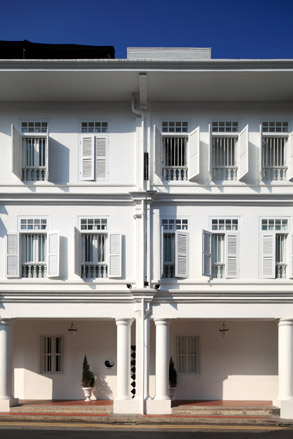
The Club boutique hotel, designed by Ministry of Design, in a 1900s building on fashionable Ann Siang Road.

An island of just 700 sq km, Singapore still makes space for innovative new builds, from eco-friendly homes and horizontal skyscrapers to a ’floating’ luxury store.
The Interlace
One of Ole Scheeren’s last designs for OMA before his departure, The Interlace apartment complex is framed by the greenery of the Southern Ridges and bears all the hallmarks of the architect, not least his Escher-like love for interlocking blocks. Eschewing the traditional high-rise, the design tips 31 towers onto their sides and stacks the six-storey blocks up in a hexagon around terraced sky gardens and private garden courtyards.
www.oma.eu

Louis Vuitton crystal pavilion
Singapore’s retail experience is moving from its ubiquitous mall setting out onto the water. Set to open later in the year, Louis Vuitton’s extravagant new flagship store – a glass-sheathed pavilion built to appear to float on the waters of Marina Bay, as part of the Marina Bay Sands resort – is another feather in the cap for designer Peter Marino.
www.louisvuitton.com
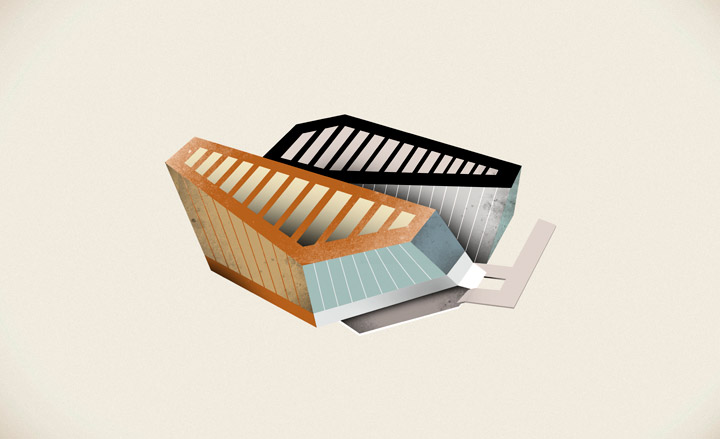
Maximum Garden House
As its name suggests, this project makes the most of the limited outdoor space that exists around it. As is typical in Singapore, the house is built on a tight plot that allowed no room for a garden at ground level. So architects Formwerkz embarked on a mission to reclaim greenery wherever possible. The result is a house with a grass roof on the first floor, a screen of plants that shields the master bedroom from the street, and a huge, wooden roof deck – the perfect place to eat, play, chat and look at the stars. Eco-elements feature heavily in Formwerkz’ architecture, and the practice is shaping up to be a central player in recasting Singapore as a ‘garden city’.
www.formwerkz.com

Park Royal on Pickering
When it opens next year, this will be Singapore’s greenest hotel. Described by its architects WoHa as a ‘hotel in a garden’, it has four floors designed around sky-parks that bring nature up to all 363 rooms. Corridors, lobbies and washrooms have been designed as garden spaces, with stepping stones, reflecting pools, waterfalls, planter terraces and green walls. Cleverly, these features echo nearby Hong Lim Park and give the property the feel of a resort, rather than a business hotel. Its zero-energy sky-garden is one of Singapore’s first, and uses solar cells to power hotel lighting, while rainwater collected from the upper floors irrigates planters and water features throughout.
www.wohadesigns.com
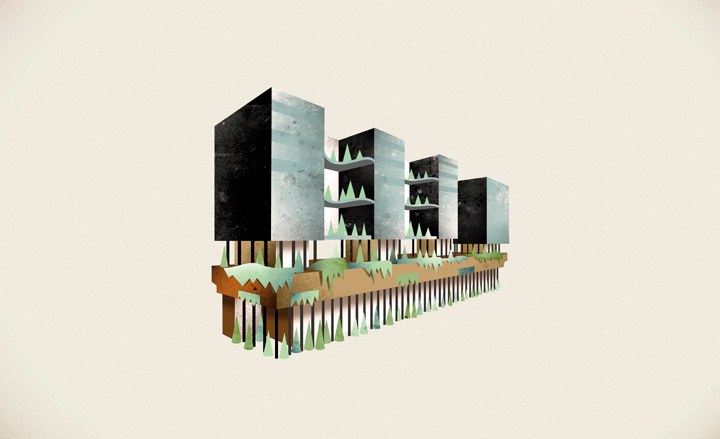
Radiator House
In Singapore, plots usually have a small street presence but extend a long way back. An architectural challenge, you might think. But not for Lekker Design. The practice’s latest private residence, the Radiator House, in the upscale neighbourhood of Bukit Timah, is a deceptively spacious home. With four pitched roofs, it looks like a row of futuristic semis, but is actually one four-bedroom family home with three garden courtyards providing mini oases of green. The house takes its name from the steel ‘chain mail’ mesh that partially covers the façade and serves to shade the building and heat water simultaneously.
www.lekkerdesign.com

From Indian rotis to Indonesian rice, Singapore’s hawker food offers a winning pan-Asian feast.
Clockwise from top, small bowl; mixing bowl, prices on request, both by Albano Daminato, www.studiodaminato.com. ‘China White’ soup bowl, S$25.50 (£12); sauce dish, S$6.50 (£3), both by Luzerne, from Landex, www.landex.com.sg. ‘Contempo’ plate, S$22.90 (£11); ‘China White’ soup bowl, S$28.50 (£14), both by Luzerne, as before. Chopsticks, S$14.90 (£7), by Muji, www.muji.com. Small bowl, by Albano Daminato, as before. ‘Objects Around The Tablescape 2’, small cup; S$460 (£223); cup, S$670 (£325); ‘Objects Around The Tablescape 4’ aluminium carafe, S$2,090 (£1,013); cup, S$1,320 (£640); bowl, S$2,210 (1,071), all by Design Incubation Centre, www.designincubationcentre.com. ‘Setcast Dune’ hors d’oeuvre dishes, S$638 (£309) each, by VW+BS, from Space Furniture, www.spacefurniture.com.sg. ‘Tea Time’ plate, price on request, by Orcadesign, www.orcadesign.net. ‘Concord’ round bowl, S$4.50 (£2), by Luzerne, as before
Food prepared by chef John See of Fork and Chopsticks restaurant, Block 26 Sin Ming Lane, Midview City, #01-121, tel: 65.6659 4657
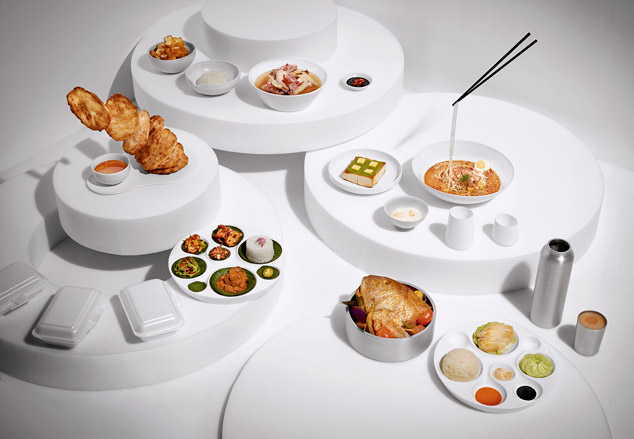
In Singapore’s restaurants, talented and adventurous young chefs are reinventing its culinary scene. Wild Rocket’s Willin Low’s culinary trajectory is almost cinematic: homesick student in London learns to recreate homey favourites by improvising with ingredients and flavours; works the corporate ladder but decides to pack it all in to open his own restaurant; wins fans for his homespun but defiantly modern and imaginative cooking. Already at the helm of four restaurants, Low continues to mine traditional local flavours for what he describes as modern Singaporean cuisine. Anyone with the chutzpah to pair teriyaki pork belly with spaghetti deserves a sequel.
www.wildrocket.com.sg
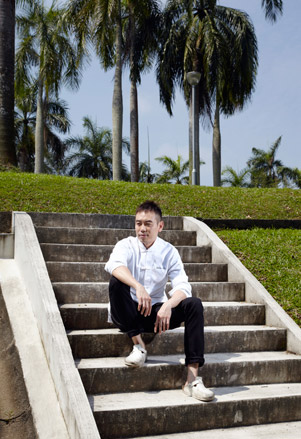
The first recipient of The Miele Guide’s At-Sunrice Culinary Scholarship Programme, Malcolm Lee of Candlenut Kitchen is bent on taking Peranakan food into the 21st century. His modus operandi is to refine his treasured family recipes by using the modern techniques he learned in cooking school. Lee’s rendition of ayam siow, a stew of spiced chicken in dark soy sauce, is first seared, then passed through a sous-vide machine to keep the mix uniformly tender and succulent. And to ensure that his food retains its authenticity, family matriarchs are roped in to provide the final stamp of approval.
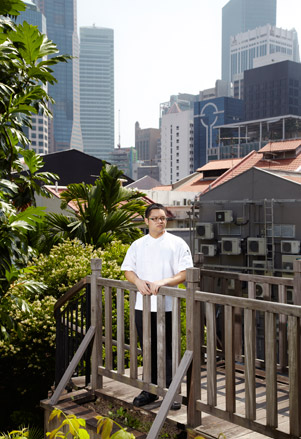
Candlenut Kitchen
Janice Wong has come a long way from mopping floors at Will Goldfarb’s New York restaurant Room 4 Dessert. These days, she trades ideas with New Basque-cuisine master Juan Mari Arzak and top patissier Pierre Hermé. At just 28, Wong is firmly plugged into the upper echelons of the pastry world, yet her desserts never stray far from her Singaporean roots. Woven into her beautifully constructed sweets are the flavours of her childhood: hawthorn, seaweed and malted milk powder. In the works is 2am:lab, her own test kitchen, workshop and photography space.
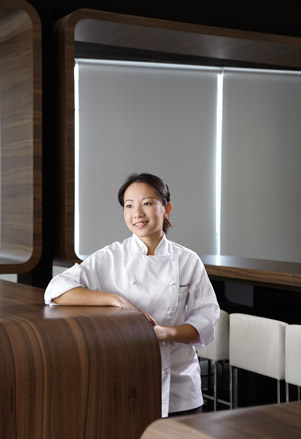
Iskander Latiff’s prosaic resumé doesn’t boast fêted names from the culinary world. In fact, he cut his teeth working with his Malay mother, selling nasi padang at her coffee shop stall. Yet, thanks to his innate talent for taking classic Malay and Indonesian flavours and turning them into modern Southeast Asian bistro fare, the charmingly unassuming Latiff has become one of the country’s most exciting chefs. Unsurprisingly, his Malay-inflected contemporary dishes – from laksa croquettes to duck rendang – have turned The Tiffin Club into a magnet for adventurous diners.
www.thetiffinclub.com
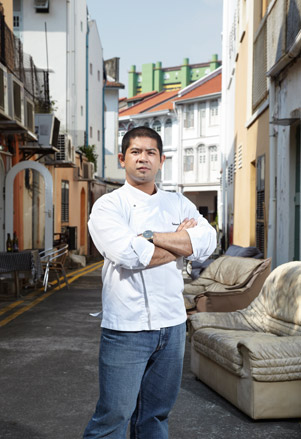
Taiwan-born chef André Chiang has opened his eponymous restaurant in a beautiful white shop-house along a quiet street in Chinatown. A meal at Restaurant André is as much a feast for the eyes as it is for the taste buds: there is artistry in every aspect of the space, from the eggshell-thin handmade plates to the eight-course tasting menu. Based on Chiang’s Octaphilosophy, it is a sort of delicious French nouvelle cuisine that includes dishes such as a shimmering oyster swathed in gelée, a pale lavender broth flecked with flower petals, or carefully rumpled coal crackers.
www.restaurantandre.com
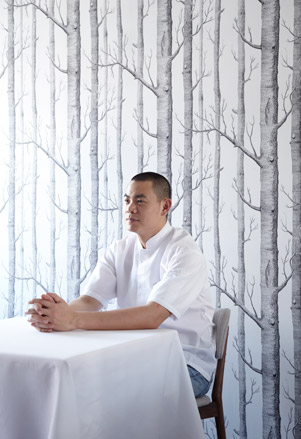
Daven Wu is the Singapore Editor at Wallpaper*. A former corporate lawyer, he has been covering Singapore and the neighbouring South-East Asian region since 1999, writing extensively about architecture, design, and travel for both the magazine and website. He is also the City Editor for the Phaidon Wallpaper* City Guide to Singapore.